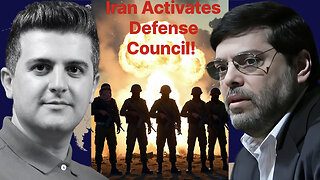Premium Only Content

Real Alternatives to Fossil Fuels
While solar and wind make poor replacements for fossil fuels, there is one alternative energy source that could potentially replace them: nuclear.
In spite of coming into public view under the shadow of the atomic bomb, significant global investments in nuclear power plants were made from the mid-1960s up until the early 2000s. Unfortunately, tragedies such as the Chornobyl meltdown caused by Soviet incompetence and the fallout from the tsunami-damaged Fukushima power plant in 2011 led governments to close existing nuclear reactors and foreclosed the building of new ones.
The stagnation in global nuclear policy has occurred alongside an increase in climate change concerns.
While nuclear power is a proven, viable alternative to fossil fuels, a meaningful increase in nuclear power would require a significant change in political policies, as well as investment in next-generation energy infrastructure. These may be wise policies for the future, but they are not practical for those demanding a radical shift away from fossil fuels within the next decade.
For context, to replace fossil fuels with nuclear energy in twenty-eight years, four one-gigawatt nuclear power plants would have to be built every day. In the last thirty years, four gigawatts of nuclear capacity have been created only every 540 days.
Other alternatives to fossil fuels and green energy have been considered as well, including hydroelectric, geothermal, hydrogen fuel cells, and biomass.
None of these are in a position to replace fossil fuels within the next few decades. All of them have been the subject of additional objections by various interest groups that are concerned about global warming. For example, environmentalists have raised concerns about the impact of building hydroelectric dams.
Most importantly, the innovation required to come up with a new energy source that has fossil fuels’ benefits and little impact on emissions requires a very unique natural resource: human genius.
Only in a society that prioritizes human creativity and entrepreneurship can individuals make the sorts of breakthroughs necessary to revolutionize energy production. Yet it is precisely this human element that is ignored, and often explicitly demonized, in favor of “the end is near” hysterics.
The result is an intellectual environment that makes it difficult to seriously discuss the tradeoffs inherent to energy policy and environmental protection.
______________________________________
Want to learn more?
For more animated content, check out Economics for Beginners at https://BeginEconomics.org.
-
 9:49
9:49
Mises Institute
3 months ago $0.18 earnedThe Great Precious Metal Premium Conspiracy | Mark Thornton
4034 -
 52:16
52:16
American Thought Leaders
17 hours agoIs There a Link Between Mass Shootings and SSRIs?
25.8K28 -
 17:12
17:12
World2Briggs
18 hours ago $0.01 earnedTop 10 Towns You Can Retire or Live on $1900 a month in the Midwest #1
9.59K1 -
 17:25
17:25
BlackDiamondGunsandGear
1 day agoCustom Building the Cheapest MP5
13.6K1 -
 LIVE
LIVE
BEK TV
23 hours agoTrent Loos in the Morning - 11/06/2025
175 watching -
 8:10
8:10
The Shannon Joy Show
17 hours agoShould we even VOTE anymore?
17.1K23 -
 59:34
59:34
Dialogue works
1 day ago $0.02 earnedMohammad Marandi: It’s WAR: Iran’s Supreme Defense Council ACTIVATES –Hezbollah REFUSES to Surrender
49.9K11 -
 10:23
10:23
TheSaltyCracker
18 hours agoMuslims Immediately Threaten New Yorkers After Zohran Win
43.7K456 -
 18:40
18:40
Actual Justice Warrior
17 hours agoMamdani Pledges To DESTROY New York
30.7K75 -
 28:53
28:53
iCkEdMeL
17 hours ago $0.06 earnedBREAKING: 9 DEAD After UPS Plane BURSTS Into Fireball at Louisville Airport
35.1K7